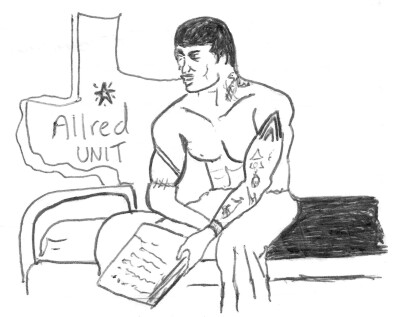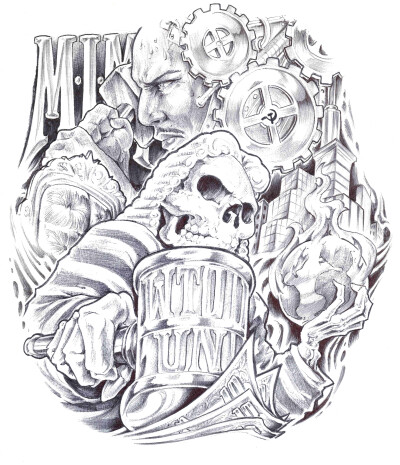I’m not sure if any of you have heard of my recent censorship
battles, but let me catch you up on this ongoing and illegal censorship
being perpetuated by the Minnesota Department of Corrections, or what we
inside refer to as the Minnesota Department of Corruption.
While I was housed in Minnesota’s only Maximum Custody Prison, Oak
Park Heights, I had been subjected to a bit of censorship. First it was
censorship of my outgoing legal mail to national organizations for legal
assistance in my Federal Suit. I had sent mail out in sealed envelopes,
clearly marked “Legal Mail” to The Exoneration Project, The Innocence
Project, The Equal Justice Project, The Legal Aid Society, The Lewisburg
Prison Project, The Constitutional Rights Center for Prisoners and every
envelope was opened outside of my presence by mailroom staff member “S.
Henry” and sent back to me with a notice of non-delivery in which it
said I had “sealed it in violation NOT Legal/Special as addressed.”
This is actually a violation of the mailroom’s own policy. DOC Policy
302.020 Procedure L.3 states that “An incoming or outgoing item
purporting to be special/legal mail that fails to meet the policy
requirements for designation as special/legal mail, or is otherwise
questionable, is opened in the presence of offender by a
supervisor.”
Yet, more than 10 “outgoing item[s] purporting to be special/legal
mail” were opened outside of my presence and refused to be sent in a
sealed envelope.
It gets worse though. After being forced to send these letters in
unsealed envelopes, when these organizations replied, even when stamped
with “LEGAL CORRESPONDENCE OPEN ONLY IN THE PRESENCE OF THE ADDRESSEE”
i.e., me, the mailroom still opened all of this mail outside of my
presence.
And when I had to file internal grievances to exhaust all remedies
due to the PLRA, of course the DOC said that staff did not act in
violation of anything, and of course the mailroom staff opened this mail
outside of my presence again violating their own policy and court
decisions. And so I filed in the Tenth Judicial District Court, only for
the judge, Gregory G. Galler, to dismiss it as frivolous or
malicious.
And then I was given disciplinary segregation for allegedly “lying
and/or misrepresentation.” Which is illegal retaliation, but what does
the Department of Corruptions care? None. Next came the censorship of
publications I had been receiving from Critical Resistance “The
Abolitionist”, this publication “ULK” and other mail from MIM(Prisons)
including over 10 different mailings, News & Letters – all of which
are political publications geared towards enlightening people on real
world issues and express anti-Prison ideology.
When fighting the censorship, according to our “policy” we have to
send an appeal to the Correspondence Review Authority(CRA). Yet when I
did, the mailroom staff, Nancy Leseman responded instead. I had included
the disclaimer that MIM(Prisons) affixes to ULK only for Leseman to
state “All publications are reviewed on an individual basis & can at
any time be denied for violating policy. An article advocates to
organized disturbances within prison walls, activities in violation of
facility rules.”
So, not only does she violate her own policy by not forwarding the
appeal to the CRA, she violates the law when censoring publications as
well.
But it only gets better from here.
Being as N. Leseman didn’t follow policy I was forced to send the
appeal to her supervisor, Lt. Jason R. Hills, in which he replied, “The
publication has contents that are not allowed per DOC Policy. Appeal
Denied. You may appeal to the CRA.” Again clearly he violates law for
censorship, and policy.
So I was forced to send the appeal directly to the CRA, which was
comprised of Cris Pawelk the Associate Warden of Operations, Sherlinda
Wheeler the Associate Warden of Administration, and Byron Matthews the
Captain.
In their reply they said, “We have read the material and determined
the content should be denied for violating MN DOC Division Directive
301.030 Contraband. One of the articles advocates for organized
disturbances within prison walls and activities in violation of facility
rules. All issues are reviewed on an individual basis. Any issue can be
denied if any part of the publication violates policy. Publications that
[sic] doesn’t violate policy is allowed. Therefore the Correspondence
Review Authority is in agreement with the Mail Room’s decision and your
appeal is denied.”
The next step was to appeal to the Assistant Commissioner of
Corrections Nate Knutson. His reply was, “This newspaper contains
graphic depiction of violence that pose a threat to facility security in
violation of DOC Division Directive 301.030 Contraband. Appeal
denied.”
But that’s not the end, after that I filed suit in the Tenth Judicial
District Court, only for the order to be dismissed as “frivolous or
malicious” because it “has no arguable basis in fact or in law.”
Now the next step is Federal Court, and and will involve even more
defendants and more evidence of censorship illegally conducted. As
MIM(Prisons) can accede, more than 10 of their mailings to me have been
met with censorship, causing loss of money, and all with absolutely no
notice or reason given by the DOC.
Censorship is this country’s way of blinding the people to only
seeing what is “favorable” to them. Freedom of speech is only true if
you don’t speak out against the regime. Any advocacy critical of the
standard is demonized and made to look as extremist and insane. And no
wonder, when 90% of the population lives only to work, the power rests
upon the sweating, bleeding, starving faces of those that toil in the
dirt beneath their polished shoes. Take comfort in this: If you’re being
censored, it’s because they fear the truth and its power. If you’re
being retaliated against, it’s because they fear you and your truth and
power. People only get mad at the truth, so go piss off those pigs!
MIM(Prisons) adds: We can confirm that we received no
notification of censorship as required by law for at least 10 pieces of
mail sent to this comrade in 2019 that ey reported not receiving. One of
these items was our guide for dealing with censorship in prison.
We commend this comrade’s persistence and eir attitude. These battles
are small ones. As our regular readers know, we win some and lose some.
But either way we win when we use these battles to inspire others and
expose those set on oppression.











